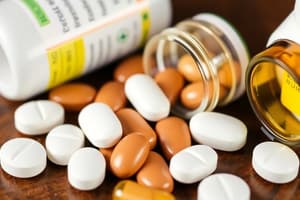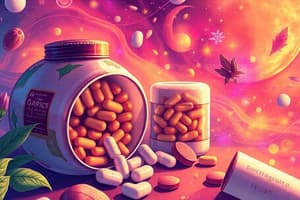Podcast
Questions and Answers
Which herb is known to increase energy and decrease sexual dysfunction?
Which herb is known to increase energy and decrease sexual dysfunction?
- Ginseng (correct)
- Valerian
- Ginkgo Biloba
- Garlic
What should be avoided when using Saw Palmetto due to similar effects?
What should be avoided when using Saw Palmetto due to similar effects?
- Anticoagulants
- Hormonal therapies
- Finasteride (Proscar) (correct)
- Antidepressants
What is a potential effect of consuming large amounts of black licorice for more than four weeks?
What is a potential effect of consuming large amounts of black licorice for more than four weeks?
- Headaches and increased blood pressure (correct)
- Decreased stress
- Increased potassium levels
- Decreased blood pressure
Which herb is associated with the risk of Serotonin Syndrome when combined with tricyclic antidepressants?
Which herb is associated with the risk of Serotonin Syndrome when combined with tricyclic antidepressants?
Which herb enhances the effects of anticoagulants and decreases inflammation?
Which herb enhances the effects of anticoagulants and decreases inflammation?
What effect does turmeric have on stomach acid levels?
What effect does turmeric have on stomach acid levels?
What effect does Ginkgo Biloba have on insulin levels in diabetics?
What effect does Ginkgo Biloba have on insulin levels in diabetics?
Which of the following is NOT a potential effect of Ginseng?
Which of the following is NOT a potential effect of Ginseng?
What is a main concern when combining garlic with anticoagulants?
What is a main concern when combining garlic with anticoagulants?
Which herb is commonly known to decrease anxiety and improve sleep disorders?
Which herb is commonly known to decrease anxiety and improve sleep disorders?
Flashcards
Ginkgo biloba interactions
Ginkgo biloba interactions
Ginkgo biloba is an herb that can interact with certain medications, including blood thinners and antidepressants. It can also lower blood pressure.
Ginseng interactions
Ginseng interactions
Ginseng is an herb that can affect blood sugar, blood pressure, and energy levels. It can interact with medications for diabetes, stress, and even sexual dysfunction.
Black licorice dangers
Black licorice dangers
Black licorice, when consumed in large quantities over extended periods, can lead to serious health consequences, including headaches, high blood pressure, and potassium depletion.
Ginger interactions
Ginger interactions
Signup and view all the flashcards
Feverfew interactions
Feverfew interactions
Signup and view all the flashcards
Garlic interactions
Garlic interactions
Signup and view all the flashcards
Valerian interactions
Valerian interactions
Signup and view all the flashcards
Kava Kava interactions
Kava Kava interactions
Signup and view all the flashcards
St. John's Wort interactions
St. John's Wort interactions
Signup and view all the flashcards
Melatonin interactions
Melatonin interactions
Signup and view all the flashcards
Study Notes
Herbal Supplement Interactions with Medications
- Ginkgo Biloba: Flavonoids in ginkgo can interact dangerously with anticoagulants. Natural products aren't always safer or less expensive than prescription drugs, and some have similar strengths to prescription or over-the-counter medications. Allergic reactions are possible with natural products, and side effects aren't necessarily fewer.
Herbal Supplement Interactions with Medications: Specific Examples
-
Ginseng: May decrease blood sugar, stress, blood pressure, and sexual function. May increase energy. Can interact with insulin and oral hypoglycemic agents, potentially increasing their effects. Can also interact with central nervous system depressants and anticoagulants, and decrease the effects of morphine.
-
Ginkgo Biloba: Acts as an antioxidant, potentially increasing blood flow and memory. May lower blood pressure and increase the risk of serotonin syndrome with tricyclic antidepressants. Can increase the effect of anticoagulants and potentially lower insulin levels in diabetics.
-
Black Licorice: Regulates hormones, potentially decreasing stress and fat. High doses (over 4 weeks) can cause headaches, increased blood pressure, and decreased potassium (dangerous). Can increase the effects of digoxin, aspirin, steroids, and increase potassium loss with laxatives.
-
Ginger: May reduce nausea, irritable bowel syndrome (IBS), stomach issues, and inflammation. May increase the effects of anticoagulants.
-
Feverfew: May decrease fever, inflammation, migraines/dizziness, nausea/vomiting, tinnitus, and blood pressure. May increase the effects of anticoagulants and nonsteroidal anti-inflammatory drugs (NSAIDs).
-
Garlic: Thins the blood and increases the effects of anticoagulants. May boost immunity and lower cholesterol.
-
Valerian: Helpful for sleep disorders. May decrease anxiety and blood pressure. Increases the effects of central nervous system depressants. (benzodiazepines, barbiturates, anticonvulsants, and sedatives).
-
Kava Kava: May help with sleep problems. Decreases stress/anxiety, seizures, and relaxes muscles. Increases the effects of central nervous system depressants, Adderall, and 5-HTPs.
-
St. John's Wort: May decrease depression, anxiety, and insomnia. May increase appetite and the effects of central nervous system depressants.
-
Melatonin: May decrease insomnia, and decrease the antidepressant effects of desipramine and fluoxetine (Prozac). Calcium channel blockers (CCBs) may decrease melatonin effects.
-
Saw Palmetto: May decrease benign prostatic hyperplasia (BPH), urinary retention, nocturia, and assist in urination initiation. May decrease iron absorption and oral contraceptive effectiveness. Avoid in pregnancy, breastfeeding, and hormone-sensitive cancers. Similar effects to finasteride (Proscar).
-
Turmeric: May decrease inflammation, tumors, infections, and stomach problems. Potentially enhances anticoagulants. Can increase stomach acid by reducing the effects of PPIs and H2 blockers.
Studying That Suits You
Use AI to generate personalized quizzes and flashcards to suit your learning preferences.
Description
This quiz explores the interactions between herbal supplements and various medications, focusing on Ginkgo Biloba and Ginseng. You'll learn about potential side effects, benefits, and the importance of understanding how natural products can interact with prescription drugs. Assess your knowledge on herbal remedies and their implications on health.




